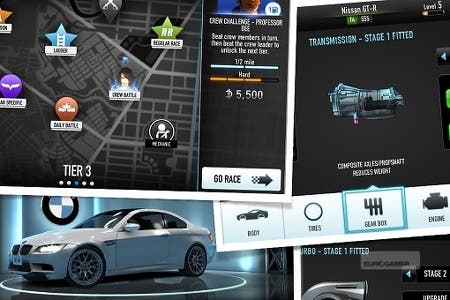CSR Racing dev defends controversial in-app purchases
"I could buy some ?1.99 shades from a street-seller or I could spend ?100 on some nice Ray Bans. They do pretty much the same job."
The developer behind CSR Racing, currently one of the highest-grossing iPhone and iPad games, has defended its controversial in-app purchases system.
The free app is the number one grossing game in 70 of the world's App Stores. But it has come in for criticism for the way it handles in-app purchases, which some players have described as too aggressive. The game encourages players to spend real world cash on in-game items, such as better cars, rather than earn them through playing alone - what some have said is a "painfully slow process".
Only last week it emerged that Russian coder Alexey V. Borodin had created an iOS exploit that allowed users to download in-app purchases for free. Why? "It's my hobby, and it's a challenge to CSR Racing," he said.
"I set this up due to hungry and lazy developers. I was very angry to see that CSR Racing developer taking money from me every single breath."
CSR Racing developer Jason Avent, now of Boss Alien, formerly of Split/Second and Pure developer Black Rock, told our friends at Hookshot Inc that the game's gas mechanic "provides a reprieve for a natural break".
"The game has a tight 30-second play loop," Avent explained. "You race, upgrade your car and then race some more. This repeats until you can beat a crew member and ultimately the crew bosses. The interface is slick and so it's easy to enter into a state of Flow playing the game. It feels satisfying to have goals and meet them regularly. That's the core design.
"The 'Gas' mechanic provides a reprieve for a natural break. At that point you can either pay for Gas or leave the game to recharge. The short-sharp play sessions mean that you're happy to come back and have another go. This design fits with the play patterns of people on the move. That's really what drove the design."
Hookshot then asked Avent whether he thought CSR Racing's style of monetisation harmed the game design.
"As long as you consider monetisation up-front then I don't think it harms the game design," he replied.
These kind of choices occur in real life all the time. I could buy some £1.99 shades from a street-seller or I could spend £100 on some nice Ray Bans. They do pretty much the same job. It's all about offering people a choice.
"We have a lot of reminders in the game that help to keep you on the right track and progress. Relatively few of these actually mention money. However payment does fit in neatly where it's appropriate. It's never compulsory to pay though and I think that's key. You can play CSR Racing forever for free if you want to. If you're really into it though you can buy all the cool stuff and show off to your friends. These kind of choices occur in real life all the time. I could buy some £1.99 shades from a street-seller or I could spend £100 on some nice Ray Bans. They do pretty much the same job. It's all about offering people a choice."
Avent said the current shift towards micro-transaction driven games is the result of a demand from gamers for flexibility in how they pay for games.
"Personally I'm tired of spending £40 on a game and then realising I only want to play it for a couple of hours," he said. "I think most people are. That's why the second-hand games market is so popular and why some people justify piracy. Micro-transaction-driven games give us the opportunity to choose what games we pay for and how much we pay. I'd liken it to pay-as-you-go mobile phones.
"Modern consumers demand flexibility in how they pay for and consume products. The beauty of downloadable games is that they cost nothing to distribute so they can be given away for free. It's also very easy to add things to a digital product."






